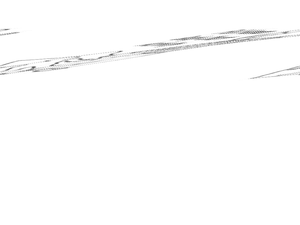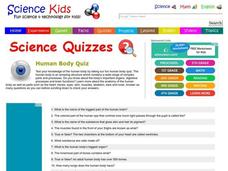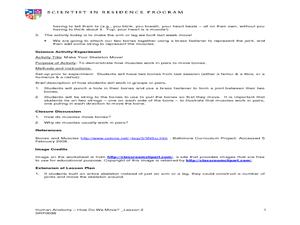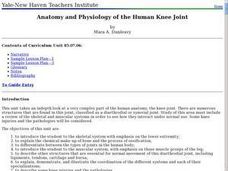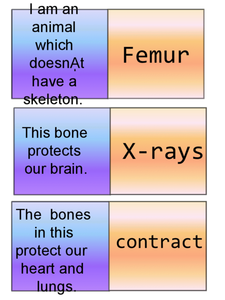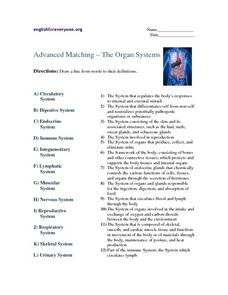Curated OER
Human Body Activity
In this human body worksheet, 2nd graders experiment making a full-sized human body portrait. Students discuss the human body organs and their functions. Students follow and complete 8 precise directives in making a human body portrait.
3D4Medical
iMuscle
Scientific names and the location of 95 muscles of the human body can be found on the three-dimensional animated man within this award-winning application. After identifying a muscle, delve into exercises that strengthen and stretch....
Curated OER
Human Anatomy- How Do We Move?
Students examine the muscular system. In this muscular system lesson, students first draw a realistic representation of their leg or arm bones. Students do several activities to attach these bones to "joints" with string to simulate the...
Curated OER
You've Got to Have Heart
After reading an excellent description of the human heart, fifth graders look at a drawing of a human body, and choose the circle they think represents where the human heart is found. There are four circles inside the character's chest....
Curated OER
Life Science: Human Body Skit
Students create skits based on the human body systems. Working in groups, they role-play as organs in the various systems. They make costumes or wear signs identifying themselves as the organs in their skits.
Curated OER
Living World Quiz 2
In this living world activity, students answer short answer questions about animals, the human body, food, and more. Students complete 20 short answer questions.
Curated OER
Human Body Quiz
In this human body learning exercise, students complete short answer questions about the organs in the body and their functions. Students complete 20 questions.
Curated OER
Human Anatomy - How Do We Move?
Fifth graders discover how blood moves around the body. In this circulatory system lesson, 5th graders feel their pulse before and after exercise. Students count their heart rate. Students use the scientific method to record their...
Curated OER
All About Blood and the Heart (Human Body for Children)
In this anatomy worksheet, students learn about the heart and it's characteristics. Students monitor their heartbeat in an experiment and then answer a series of questions about what they found.
Curated OER
Anatomy and Physiology of the Human Knee Joint
Students examine human anatomy with a focus on the knee joint. In groups, they research the chemical makeup of human bones and explain the different types of joints found in the body. To end the instructional activity, they identify the...
Curated OER
Anatomy Card Game
Print these cards to play any number of games as a way to practice human anatomy vocabulary. There are 20 cards, 10 contain definitions or clues and 10 contain the answers to those clues. They could be used to play memory, a jigsaw...
Curated OER
Advanced Matching - The Organ Systems
What's the difference between the digestive system and the endocrine system? Explore 12 body systems in this anatomy matching worksheet, for which learners find descriptions corresponding to anatomical terminology. Some of the...
Curated OER
Anatomy Review
For this biology worksheet, students examine the internal functions of the human body while considering the factors needed to explain the physiological reactions.
Curated OER
Human Anatomy
Students use the web to explain how the bones serve as protection for organs in the body and recognize some of the bone structure that protect certain organs. They comprehend the different structure and functions of support tissue...
Curated OER
Natural Born Robots: Body Builders
Young scholars perform activities to explore how their arm works and what muscles are involved. They view animated comparisons of human and robotic arms. Students create a model of the human arm.
Curated OER
Levers in the Body: They Are Not What You Might Think!
Students investigate lever systems in the human body and compare arm anatomy to model. In this human levers instructional activity students graph and analyze their results.
Curated OER
The Nervous System
Students investigate the nervous system. In this anatomy activity, students identify and define vocabulary related to the nervous system. Students role play the parts of a nervous system and perform an experiment measuring and comparing...
Curated OER
Anatomy and Physiology "Quickies"
Students use a variety of creative writing tools within this assignment: poems on particular organ systems, write a short story and/or create a word graph. They are involved in a demonstration of lactic build up in the muscles, a...
Curated OER
21st Century Medicine: Nerves of Steel
Students model a sarcomere's action, they gain a kinesthetic and visual understanding of muscle contraction. They use this exercise stimulates the production of myosin and actin. Students use two colors of clay, make a "sandwich" of...
Curated OER
MuscleMania
Students learn three different types of muscles. By building a model of the arm, they learn its basic anatomy and how muscles function in relationship to bones. They perform an experiment on the relationship between muscle size and...
Howard Hughes Medical Institute
Measuring Obesity
Studies show that obesity is now a global problem. But how are researchers measuring obesity? Young scientists investigate the myriad of methods for measuring body fat through a presentation. From hands-on to high-tech, viewers learn...
Curated OER
The Skeletal System
Students research the skeletal system. In this anatomy lesson, students measure their bodies to find the approximate length of their bones. They draw and cut out each of the bones and then attach them using brads or glue.
BioEd Online
The Skeleton
Don't be chicken to try a lesson plan that compares the anatomy of birds to humans. Read the background information so you don't have to wing it when it comes to the anatomy of a chicken. Prepare cooked chicken bones by soaking them in a...
Curated OER
Animals
Unifying themes in animal anatomy and physiology are displayed slide by slide. The main concepts involve the differentiation in cells and tissues, and details are given about fuel management, metabolism, and some other essential processes.


